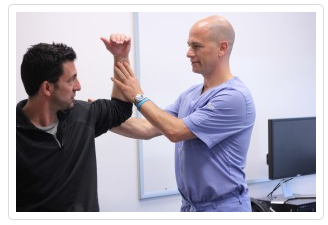THE MYTHS AND TRUTHS BEHIND CORTISONE INJECTIONS

Cortisone is part of a larger class of medications called corticosteroids, which are commonly used to treat inflammation in the body. Cortisone can be prescribed locally, through an injection, or systemically, through pills. In orthopedics a cortisone shot may be prescribed in order to decrease the body’s inflammatory response to an injury or a chronic condition such as arthritis. Generally, due to the decreased inflammation, patients are able to rehabilitate their injury with less pain, and return to their pre-injury activities sooner. Because cortisone is a common treatment prescribed by many doctors for a wide variety of issues, there is a lot of information and misinformation surrounding the use of cortisone injections. Below are some of the biggest myths and truths.
Myth: Cortisone shots generally cause more harm than good.
Many patients are concerned when they hear their doctor suggest a cortisone shot. While it is true that cortisone shots should not be done constantly, the majority of doctors agree that cortisone injections, when used appropriately, pose very little risk to your body. If you have any concerns about the use of cortisone for your injury, check with Dr. Millstein or your internist.
Myth: Cortisone shots function as pain relievers.
Cortisone is not a painkiller. Although a cortisone shot may relieve your pain, this is due to its anti-inflammatory properties.
Fact: No one can predict to what degree cortisone will help your symptoms and for how long.
Cortisone’s ability to work is entirely based on the individual’s body. Some patients receive months of pain relief whereas others experience only a few days or none at all. There is unfortunately no way to know where a patient will fall within this spectrum, but the majority of patients experience relief somewhere in between these two extremes.
Myth: A cortisone shot will affect other parts of my body.
Because the injection contains only a small amount of cortisone, and it is injected locally, cortisone generally does not affect other parts of the body. The one caveat to this general rule is seen in insulin-dependent diabetics; although uncommon, cortisone injections can sometimes raise blood sugars in diabetics. If you are diabetic and receive a cortisone shot it is strongly recommended that you monitor your sugars more closely that night and call your internist if you feel extra insulin is needed.
Myth: Cortisone shots work quickly.
When you receive a cortisone shot a small amount of Novocain is injected simultaneously with the cortisone, and so you may feel better instantly because your pain receptors are numbed. However, after the Novocain wears off you may experience pain that is sometimes even worse than the pre-shot pain. The cortisone needs time to bring down the inflammation before the pain relief starts, and this can take between 3-5 days.
Find Orthopedic Help
If you have questions about cortisone injections and their ability to help you recover from an injury, schedule an appointment with Los Angeles surgeon Dr. Eric Millstein at (310) 595-1030.

